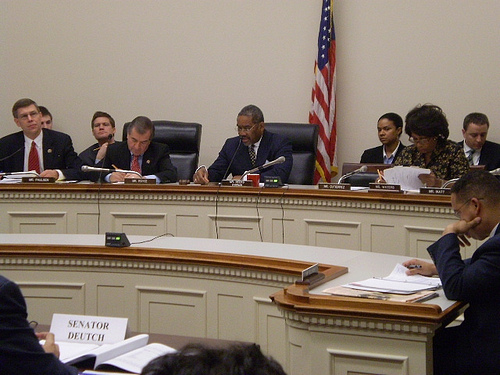 Economic sanctions have often been a tool used by the US government in order to punish rogue (sorry, couldn’t think of anything else) regimes. Such has been the case when dealing with countries such as Iran, Myanmar and Zimbabwe. While the results have been mixed, the moral imperative has been quite clear. It is wrong to do business with governments that are directly involved in human rights violations. It’s sad to say, but the genocide in Darfur, Sudan has really helped put these sanctions and socially responsible investing (SRI) on the map.
Economic sanctions have often been a tool used by the US government in order to punish rogue (sorry, couldn’t think of anything else) regimes. Such has been the case when dealing with countries such as Iran, Myanmar and Zimbabwe. While the results have been mixed, the moral imperative has been quite clear. It is wrong to do business with governments that are directly involved in human rights violations. It’s sad to say, but the genocide in Darfur, Sudan has really helped put these sanctions and socially responsible investing (SRI) on the map.
In 2007, the US government passed the Sudan Accountability and Divestment Act (SADA), which I touched on in a previous article here. This act, “Authorizes a state or local government to divest state or local assets or prohibit investment of state or local assets in persons that are conducting or have direct investments in business operations in Sudan that include power production activities, mineral extraction activities, oil-related activities, or the production of military equipment.” Last week, there was a hearing on “Investments Tied to Genocide: Sudan Investment and Beyond”, by the Subcommittee on Domestic and International Monetary Policy, that revisited SADA and looked at ways to improve its function.
So, how would its function be improved? Well, lets first look at what impact the bill has had. According to the GAO, 35 states have enacted legislation in divestiture from Sudan and “U.S. shares invested in six key foreign companies [companies not listed] with Sudan-related business operations declined by almost 60 percent from March 2007 to December 2009.” While divestiture cannot be solely related to human right concerns, prices of a U.S. portfolio of Sudan-related equities, rose 7% during that same period, which perhaps shows some other motive rather than profit taking.
Perhaps, people are getting the message, although often individual (as well as institutional) investors are putting their money into index funds which may include foreign companies doing business in Sudan (Petro China is oft sighted) and these fund managers are obligated to fill “fiduciary responsibilities”. Clearly, as is often the case, transparency among businesses and investment firms, as well as due diligence on the part of investors is paramount. Investment firms should institute policies that address ESG or at a minimum human rights issues within their portfolios. Other options include delisting companies from US stock exchanges. One can purchase Petro China (PTR) on the NYSE. Delisting from a US market, even for such a large company could have an impact on accessibility to capital.
Knowing where your money is going, not only as a financial issue, but as one that has important societal ramifications should not be overlooked. The US government and corporations should be doing the right thing, but shareholders (or former shareholders) are the ones who really possess the power and it appears they are catching on.
Image Credit by gregorywmeeks via Flickr under a CC license



